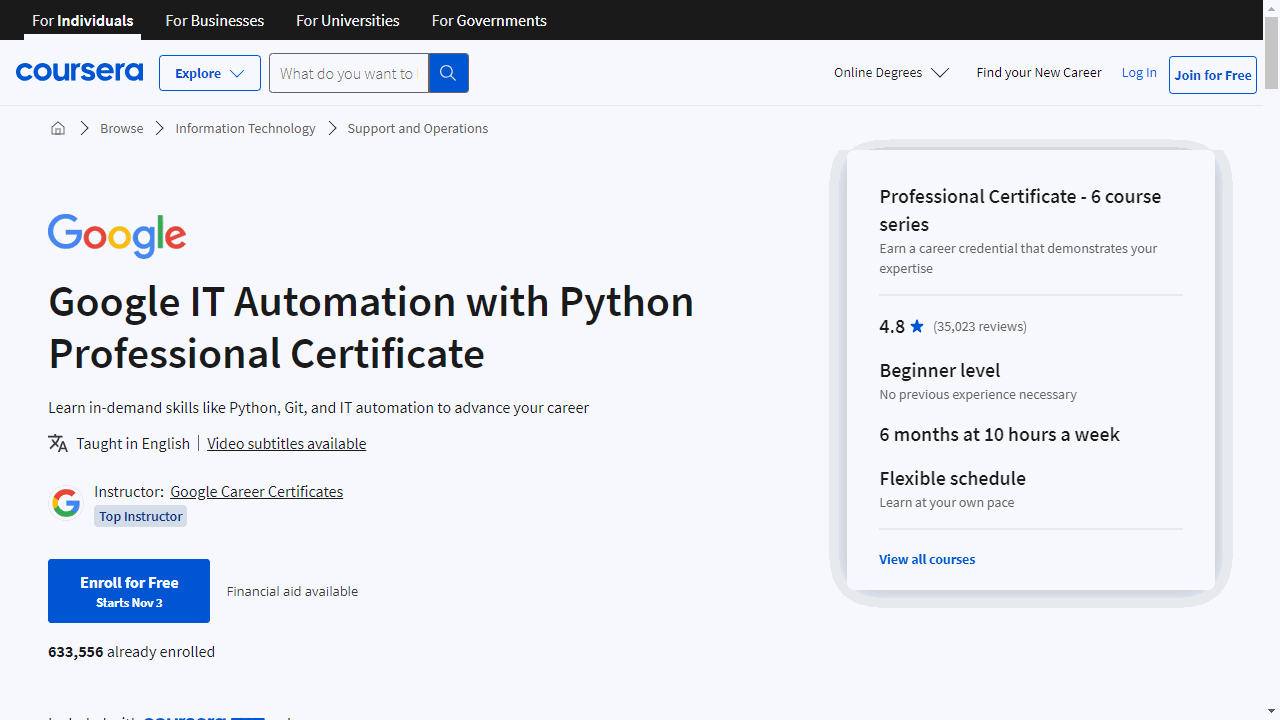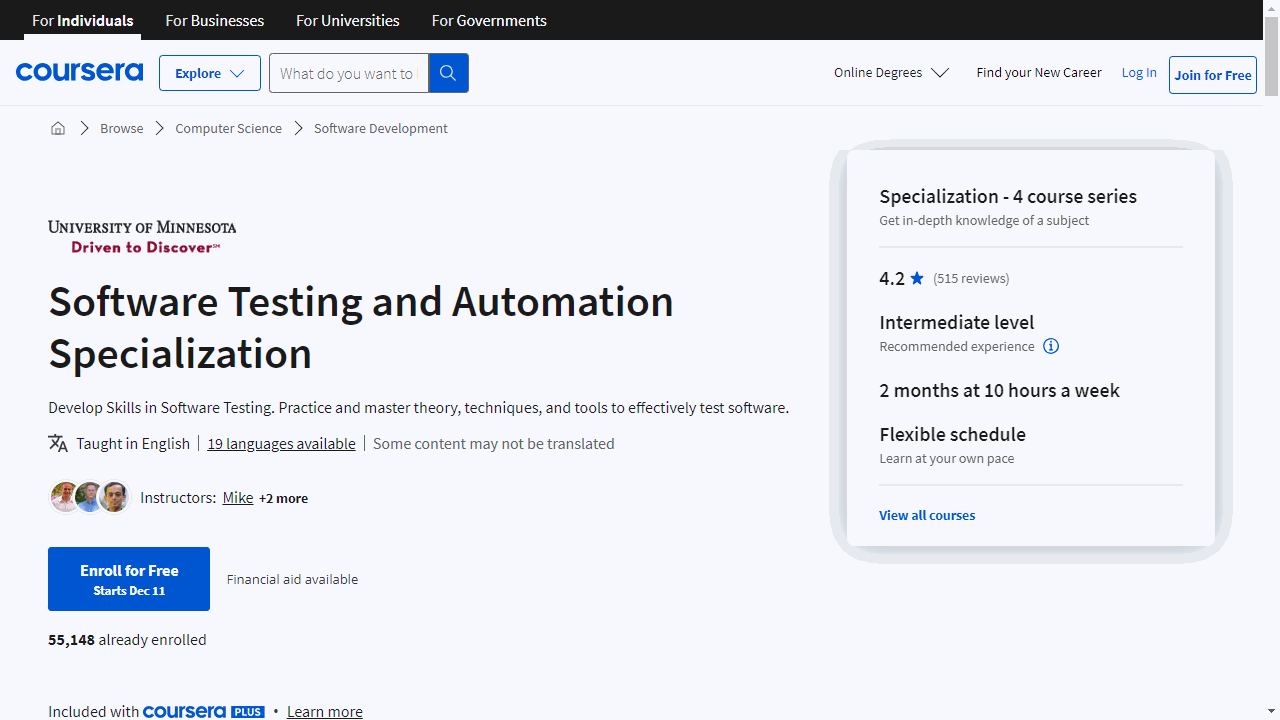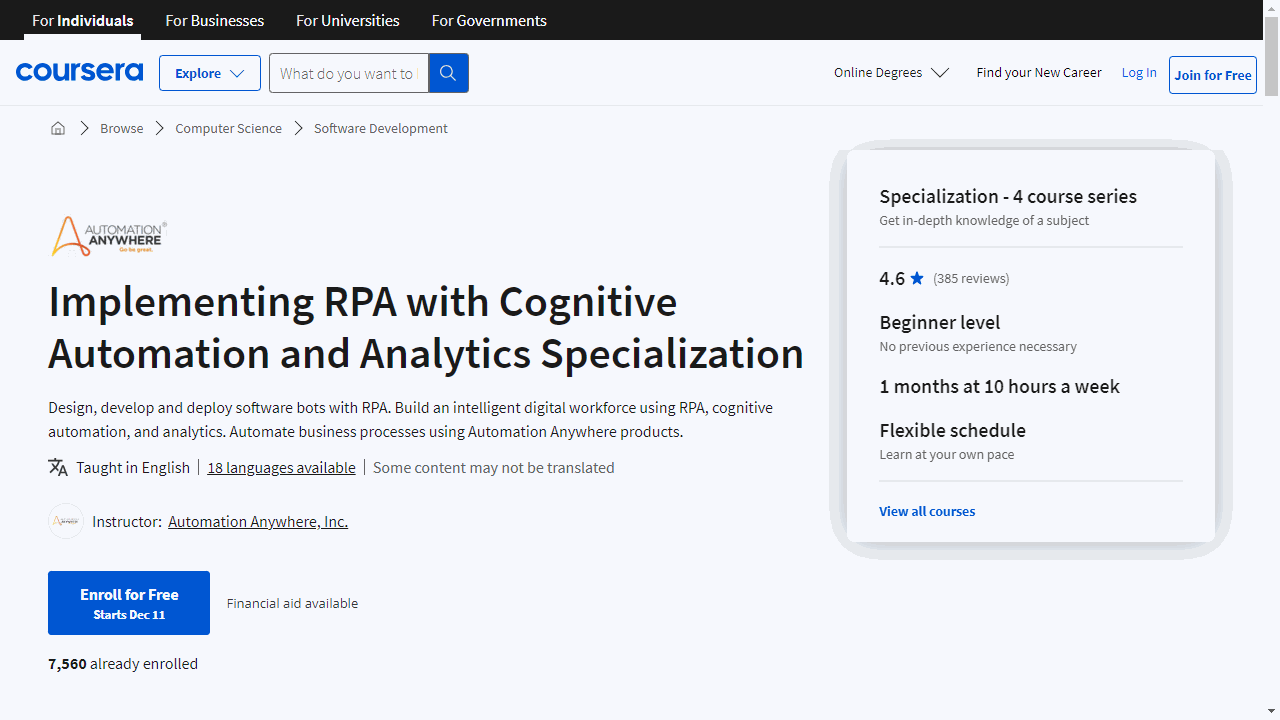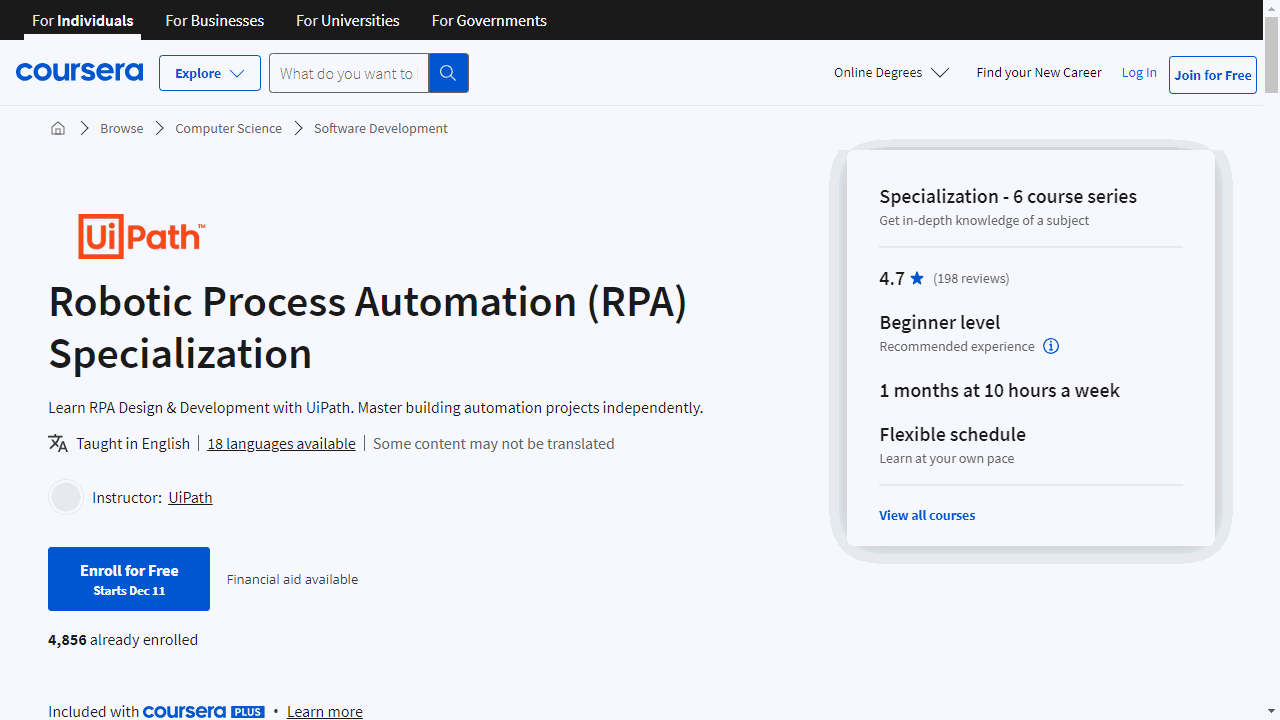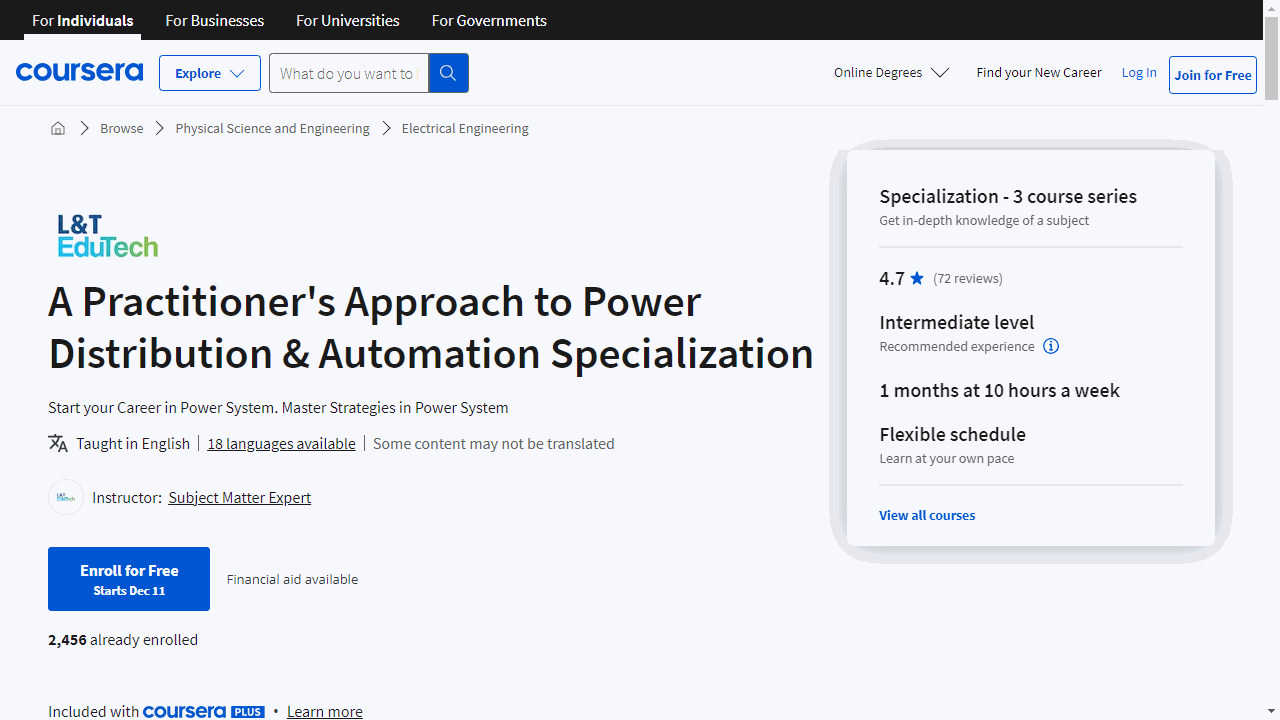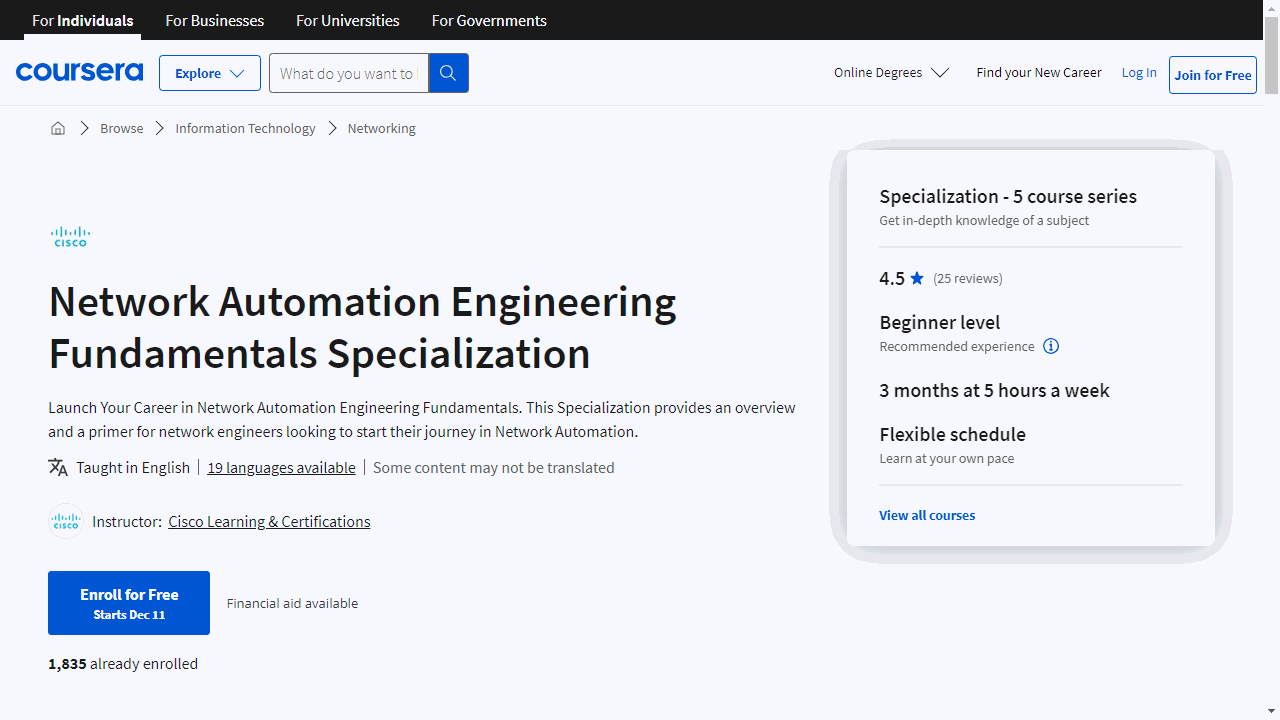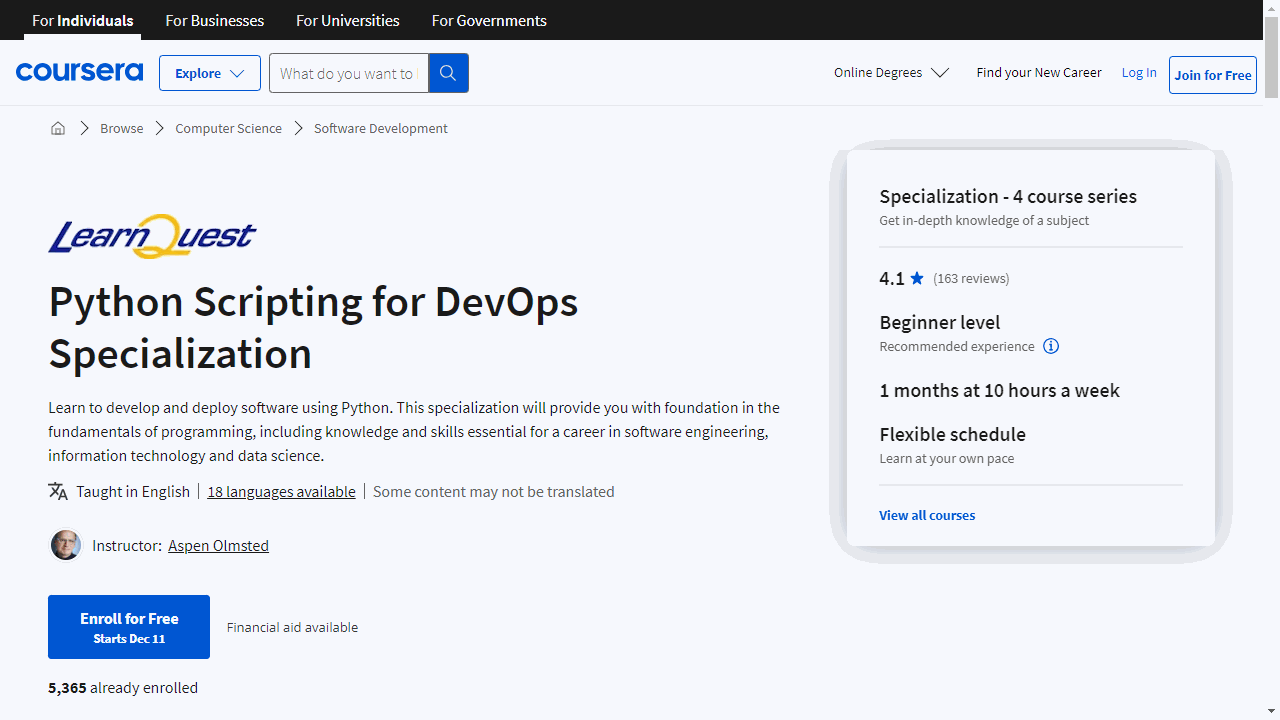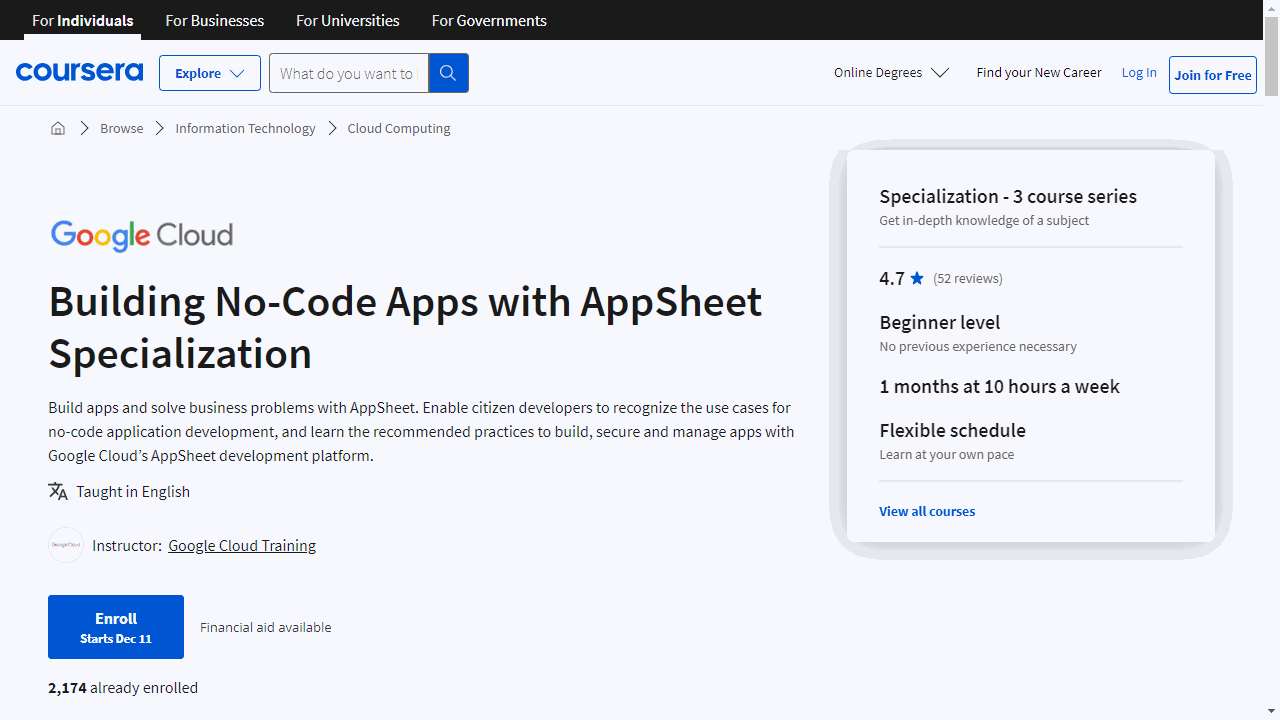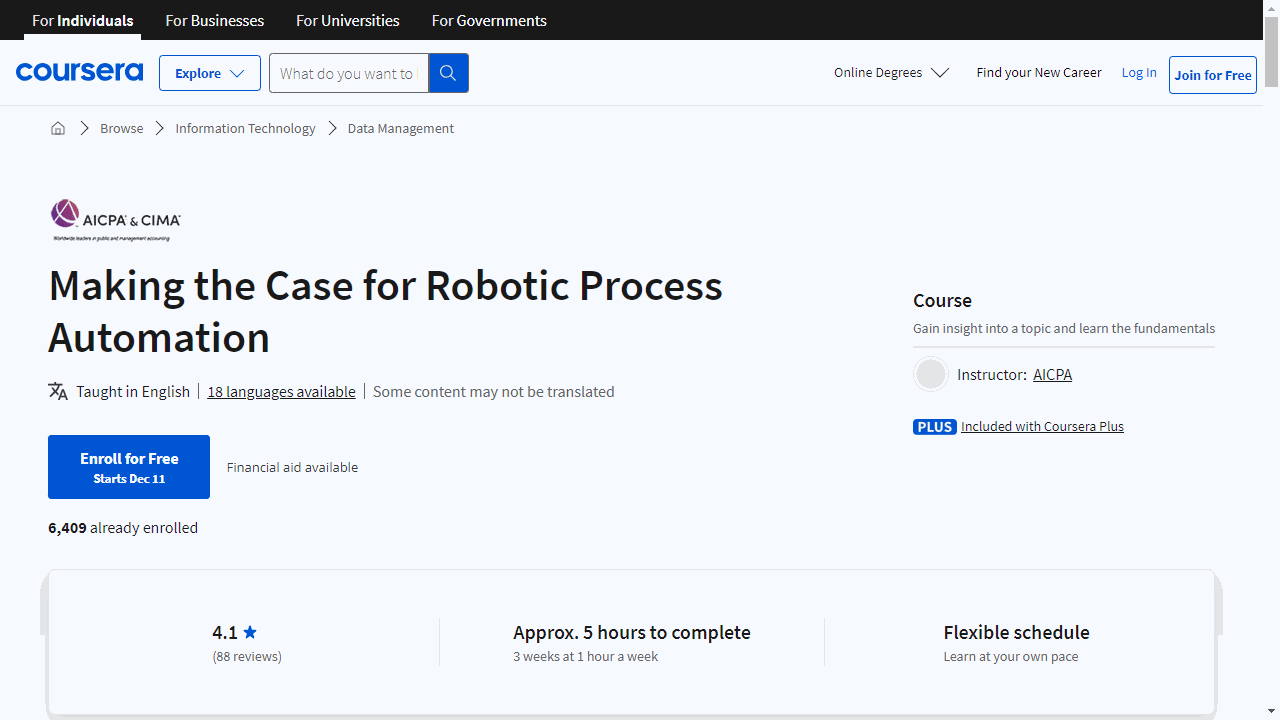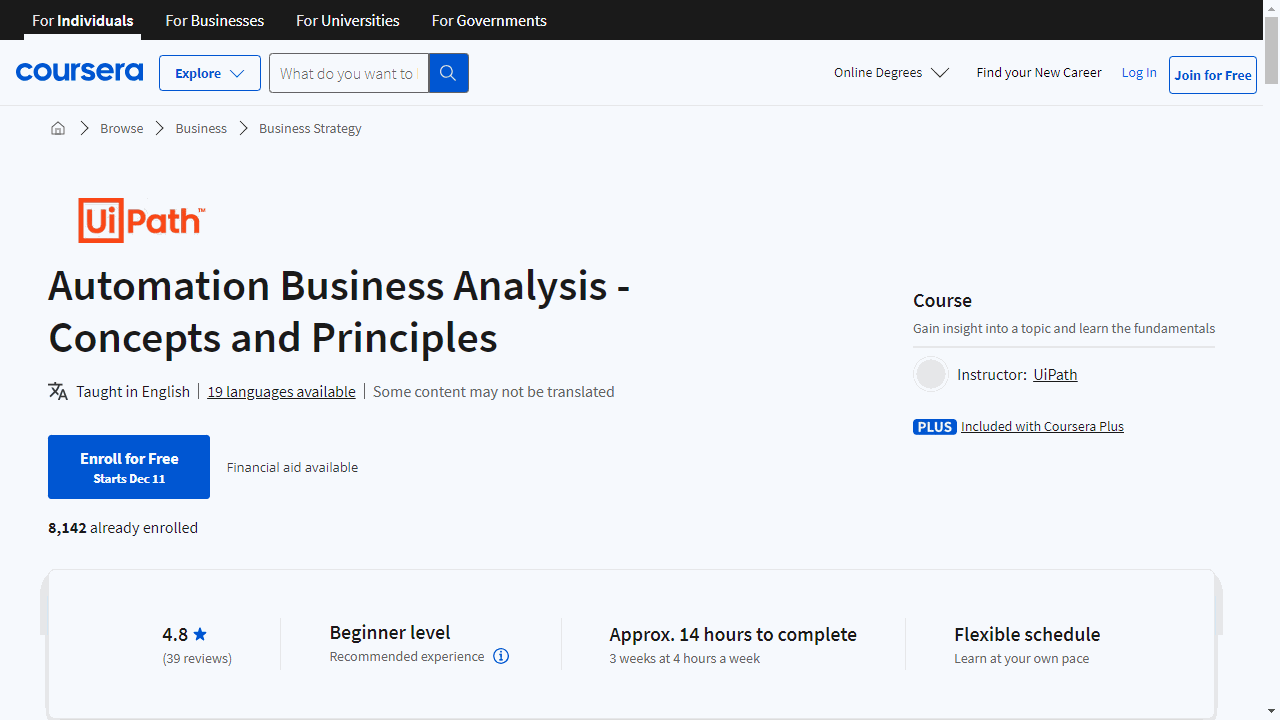Automating tasks and processes is essential in today’s tech-driven world.
Learning automation skills can open doors to exciting career opportunities in fields like IT, DevOps, and software development.
You can streamline workflows, increase efficiency, and focus on more strategic initiatives.
Finding a reliable and engaging course on automation can be challenging, with so many options available.
You want a course that’s comprehensive, well-structured, and taught by experts.
We’ve reviewed numerous automation courses on Coursera and recommend the “Google IT Automation with Python Professional Certificate” as the best overall.
It’s a hands-on program that covers essential skills like Python programming, Git and GitHub, Linux, and IT automation.
You’ll learn everything from basic Python syntax to real-world automation solutions.
This course is highly regarded for its practical approach, clear explanations, and its ability to equip you with the skills needed for a successful career in IT automation.
But if you’re looking for a different kind of automation skill, or a course that focuses on a specific platform or technology, we’ve got you covered.
We’ve compiled a list of other excellent automation courses, with detailed reviews of each one.
Keep reading to find the perfect course for your needs and career aspirations.
Google IT Automation with Python Professional Certificate
Provider: Google
This hands-on certificate program teaches you Python, Git and GitHub, Linux, and IT automation from the ground up.
You’ll start by learning basic Python programming.
“The Crash Course on Python” teaches you Python syntax, data structures, and how to build simple programs. No prior experience needed!
Next, “Using Python to Interact with the Operating System” shows you how to manipulate files, processes, and automate tasks on any operating system.
“Introduction to Git and GitHub” teaches you to track code changes and collaborate with version control.
The certificate also covers crucial troubleshooting and debugging skills. You’ll learn strategies to tackle common pitfalls in code and IT infrastructure.
“Configuration Management and the Cloud” helps you automate fleet management and cloud computing.
Finally, you’ll tie everything together by building real-world automation solutions in Python.
The skills covered equip you to automate tasks, process data, build tools to solve problems, and more.
Software Testing and Automation Specialization
Provider: University of Minnesota
This specialization equips you with the skills to ensure software functions flawlessly.
Start with “Introduction to Software Testing,” where you’ll grasp the core principles of software testing.
You’ll differentiate between verification and validation, craft and automate test cases, and become fluent in essential testing vocabulary.
This course is ideal if you’re familiar with Java and the software development lifecycle.
Progress to “Black-box and White-box Testing” to deepen your understanding of testing techniques.
You’ll evaluate software requirements for testability, apply input selection methods like fuzzing, and automate tests using Cucumber.
Java proficiency and experience with an IDE such as Eclipse are prerequisites for success in this course.
“Introduction to Automated Analysis” introduces you to advanced automated testing and verification techniques.
You’ll explore how to prove software meets requirements and is bug-free, using a variety of tools for automated verification.
Prior knowledge of software testing principles and familiarity with Java will help you make the most of this course.
Finally, “Web and Mobile Testing with Selenium” zeroes in on testing user-facing interfaces.
You’ll learn to test web and mobile platforms effectively and automate these tests with Selenium, ensuring a quality user experience.
By completing these courses, you’ll master writing defect reports, developing test plans, and employing testing frameworks like JUnit and Selenium.
You’ll be adept at writing comprehensive tests for various quality aspects and automating software verification.
It’s perfect if you’re aiming for roles such as Software Engineer, Test Automation Engineer, or DevOps Engineer.
Implementing RPA with Cognitive Automation and Analytics Specialization
Provider: Automation Anywhere
This comprehensive program guides you through the RPA lifecycle, blending in cognitive solutions and analytics for a robust learning experience.
Start with “RPA Lifecycle: Introduction, Discovery and Design,” where you’ll dive into RPA basics and understand how it’s transforming businesses into digital workplaces.
You’ll identify processes ready for automation and craft a strategic plan using Automation Anywhere’s RPA architecture and tools like the Process Assessment Template.
Move on to “RPA Lifecycle: Development and Testing,” where you’ll develop and test bots without needing deep programming skills.
The course introduces you to the Automation Anywhere Enterprise Client, teaching you to automate tasks using recorders, workbench components, and various commands.
In “RPA Lifecycle: Deployment and Maintenance,” you’ll learn to deploy and maintain your bots efficiently.
The course covers the Web Control Room, a platform for bot management and performance monitoring, and provides you with troubleshooting techniques to ensure smooth operations.
The final course, “Cognitive Solutions and RPA Analytics,” reveals how AI can enhance RPA by processing unstructured data.
You’ll explore IQ Bot and learn to use RPA analytics for actionable insights, even on the move with the RPA mobile app.
By the end of the specialization, you’ll have mastered designing automation blueprints, problem-solving, bot scheduling, and document validation.
You’ll be equipped to analyze processes for automation potential and estimate the effort required for implementation.
Robotic Process Automation (RPA) Specialization
Provider: UiPath
This specialization is a comprehensive journey from the basics to advanced RPA techniques, all on one platform.
Kick off with “RPA Basics and Introduction to UiPath” to understand RPA concepts and navigate the UiPath Studio.
You’ll quickly move from theory to action, creating your first automation project.
In “Data Manipulation in RPA,” you’ll tackle Variables and Arguments, learning to manipulate data within Studio.
The course’s practical exercises ensure you can apply these skills in real-world scenarios.
“UI Automation and Selectors” teaches you to automate interactions with various applications, such as Excel and websites.
You’ll master Selectors and the Recording feature, translating user actions into workflows.
With “Control Flow in RPA,” control the sequence of actions in your automation projects.
You’ll delve into loops, flowcharts, and error handling, essential for maintaining smooth automation processes.
“Automation Techniques in RPA” expands your skill set to data extraction from screens, websites, and PDFs.
You’ll also explore automation in Excel and email management, streamlining repetitive tasks.
The final course, “UiPath Orchestrator and Capstone Projects,” introduces you to Orchestrator for managing your RPA solutions.
The Capstone Projects are your opportunity to apply your knowledge to challenging problems, honing your ability to create robust automation.
This specialization equips you with critical thinking and practical skills in decision-making, UI automation, workflow creation, and more.
A Practitioner’s Approach to Power Distribution & Automation Specialization
Provider: L&T EduTech
This specialization is crafted to equip you with hands-on knowledge in power distribution and substation automation, crucial for modern electrical engineering.
Dive into “Electrical Power Distribution” to understand the nuts and bolts of managing power up to 33kV.
You’ll learn how to execute projects on-site, test, and commission with a strong emphasis on safety.
This course is ideal if you’re aiming to become a Construction Engineer, Planning Engineer, or Commissioning Engineer.
It covers everything from distribution methods and types of loads to the nitty-gritty of SCADA systems.
Move on to “MV Substation - An industrial approach (PART-A)” for a deep dive into substation engineering.
This course is tailored to show you the ropes of industry practices, equipment selection, and safety protocols.
It’s a must if you’re looking to excel as an Electrical Design Engineer or Construction and Planning Engineer.
You’ll get familiar with substation types, components, transformers, switchgear, and the essentials of protection systems.
Then, “MV Substation - An industrial approach (PART-B)” builds on Part A, focusing on the practical aspects of cables, earthing, and lightning protection.
It also delves into the civil and mechanical facets of substation design, along with maintenance and safety practices.
Throughout these courses, you’ll develop skills in electrical commissioning, design concepts, and a holistic approach to engineering.
You’ll be learning from L&T’s subject matter experts, ensuring you’re getting insights from some of the best in the industry.
Network Automation Engineering Fundamentals Specialization
Provider: Cisco Learning and Certifications
This set of courses is designed to empower network professionals with the automation skills needed to excel in today’s network industry.
Kick off with “Introduction to Network Automation,” where you’ll understand the crucial role of automation in network management.
You’ll interpret Python scripts tailored for network tasks, setting the stage for more advanced learning.
Make sure you’re up to speed with network routing, switching, and have some Python and Linux background.
Move on to “Using APIs for Network Automation,” where APIs take center stage.
You’ll decode data formats, craft API calls, and automate network devices using Python.
This course is a fit if you’re already versed in networking basics and Python scripting.
Dive deeper with “Ansible for Network Automation.”
Here, you’ll master Ansible, an essential tool for simplifying network management, and Jinja2 for creating flexible automation tasks.
By the end, you’ll be creating Ansible playbooks and Jinja2 templates to manage networks efficiently.
In “DevOps for Network Automation (NetDevOps),” you’ll explore DevOps tools and methodologies that enhance network operations.
You’ll differentiate between software development methods and apply DevOps principles to network tasks, paving the way for more streamlined operations.
Finally, “Introducing Model-Driven Programmability” will familiarize you with YANG data models and the standardized approach they provide for network device interactions.
You’ll delve into NETCONF, RESTCONF, and Python libraries that interface with these technologies, rounding out your network automation expertise.
Each course builds upon your knowledge of network fundamentals and Python, preparing you to automate network operations effectively.
Python Scripting for DevOps Specialization
Provider: LearnQuest
If you’re looking to make computers work for you and streamline your workflow, this specialization is your answer.
This series of courses is a practical journey into Python scripting, a must-have skill for DevOps and automation.
Kick off with “Introduction to Python Scripting for DevOps,” where you’ll grasp the essentials of procedural programming.
You’ll learn to handle user input, produce console output, manage variables, and control your program’s flow with decisions and loops.
The labs provide a hands-on experience, reinforcing your learning by solving practical problems.
Move on to “Python Scripting: Dates, Classes and Collections,” where you’ll tackle advanced string operations and date handling.
This course empowers you to model and develop classes and manage data with collections, equipping you to create sophisticated programs for business and mathematical applications.
The third course, “Python Scripting: Files, Inheritance, and Databases,” introduces you to file management, a cornerstone of data handling.
You’ll delve into inheritance to streamline your code and use external libraries like Numpy for advanced computational tasks.
Conclude your learning with “DevOps and Build Automation with Python,” where you’ll apply Python to automate DevOps processes.
This course covers unit testing, integration testing, and manual testing, ensuring your code is robust and reliable.
By the end of this specialization, you’ll have a robust foundation in Python, ready to tackle real-world automation challenges.
Get set to code, solve, and automate with confidence!
Building No-Code Apps with AppSheet Specialization
Provider: Google Cloud
This specialization helps you take control and innovate, whether you’re optimizing your business or bringing a personal project to life.
Kick off with “Building No-Code Apps with AppSheet: Foundations,” where you’ll transform basic spreadsheets into interactive apps.
This course equips you with the essentials of AppSheet, allowing you to design an engaging user experience and publish your app confidently.
Progress to “Building No-Code Apps with AppSheet: Implementation,” where you’ll enhance your app with advanced features.
Learn to manage data, secure your app, and weave in powerful integrations.
You’ll also master collaboration techniques and troubleshoot like a pro, ensuring your app stays up-to-date and performs flawlessly.
The final course, “Building No-Code Apps with AppSheet: Automation,” is where you’ll unlock the full potential of business process automation.
Discover how to send notifications, parse documents, and generate reports—all within your app.
By connecting with Google Workspace, you’ll streamline your workflow in ways you never imagined.
Throughout this specialization, you’ll gain hands-on experience with access control, version management, and application security.
You’ll also become adept at using AppSheet’s automation features to elevate your app’s functionality.
By the end of these courses, you’ll not only have built your own app but also automated its processes, saving you time and resources.
Making the Case for Robotic Process Automation
Provider: Association of International Certified Professional Accountants
This course is tailored to give you a comprehensive understanding of RPA and how to champion its adoption in your workplace.
You’ll start by getting to grips with RPA basics, including its definition and the various levels of automation.
Through interactive discussions and hands-on exercises, these concepts will become second nature to you.
Six Sigma principles are also a key part of the curriculum, teaching you how to refine RPA processes for peak efficiency.
You’ll actively engage with this material, ensuring you can apply Six Sigma methodologies within an RPA context.
The course then shifts to the practical application of RPA.
You’ll identify which business processes are ripe for automation and learn the steps to implement RPA effectively.
This includes exercises like identifying critical data elements in a use case scenario.
Building a compelling RPA business case is crucial, and you’ll master this by learning to assess requirements, pinpoint the best processes for RPA, and manage potential risks.
You’ll also discover how to secure buy-in and support for your RPA initiatives.
You won’t just learn how to start an RPA project; you’ll also understand how to sustain it.
This includes selecting the right tools and methodologies, documenting processes, and capturing ongoing process changes.
The course will guide you through creating a proof of value, even if initial POCs don’t meet expectations.
Prioritization is another skill you’ll develop, as you’ll need to decide which RPA projects to tackle first.
You’ll set success metrics, evaluate the impact on revenue, and craft a strategic roadmap for RPA deployment.
The course wraps up with practical steps for executing a POC, testing and validating your RPA, and evaluating outcomes.
You’ll be encouraged to strive for continuous improvement, ensuring your RPA efforts deliver lasting value.
Automation Business Analysis - Concepts and Principles
Provider: UiPath
This course is a treasure trove of insights, blending essential theory with hands-on practice to equip you with the skills needed in the automation landscape.
You’ll start with the core of business analysis, tackling the Five “W"s—what it is, why it matters, when and who performs it, and how to document the outcomes.
This foundational knowledge sets the stage for more advanced topics.
As you progress, you’ll delve into the nuances of requirements versus design, learning to navigate and architect the complex landscape of business needs.
Through interactive workbook activities and real-world case studies, you’ll apply your newfound knowledge, reinforcing your learning.
The course introduces you to the UiPath Requirements Analysis Framework, where you’ll explore the elicitation cycle and various techniques to gather and analyze requirements.
This framework is crucial for understanding how business analysis integrates with automation.
Your journey continues with the RPA Discovery Journey, where you’ll engage in discovery analysis and initiative visioning.
You’ll become proficient in using SIPOC diagrams and conducting impact analysis, essential tools for any business analyst.
You’ll also dive into business and process analysis, learning to educate stakeholders on RPA capabilities and analyze current and future business processes.
This section is vital for understanding how to model and improve business processes for automation.
The course covers non-functional requirements and the selection of automation tools, ensuring you’re well-versed in all aspects of the automation process.
You’ll also create future state process maps and use cases, and manage business rules and data requirements.
By the end of the course, you’ll be adept at documenting user interface specifications and preparing for the launch of automation projects.
You’ll have a comprehensive understanding of managing requirements and the complete specification process.
With additional resources like the free BABOK Guide from IIBA, this course is not just educational but also career-enhancing.
The partnership between UiPath and IIBA guarantees that the content is relevant and aligned with industry standards.
In essence, if you’re aiming to become proficient in automation business analysis, this course offers a structured, practical approach to learning.
You’ll leave with the confidence and competence to tackle automation projects, making you an invaluable asset in the evolving world of business.
